Thanks for joining uspublished at 07:05 GMT 3 February
We're closing this page now and continuing our live coverage here. Stick with us for more updates.
We've closed this live page, but we are continuing our live coverage here
Donald Trump says US tariffs on imports from the EU "will definitely happen" following similar moves targeting Canada, Mexico and China
He does not rule out imposing tariffs on UK goods and says the country is "out of line", but the situation "can be worked out" with PM Sir Keir Starmer who has "been very nice"
Trump says he will speak to Mexico and Canada's leaders on Monday. US tariffs of 25% on the two countries' goods, and a 10% tariff on Chinese goods, are due to kick in from Tuesday
Canada and Mexico are set to impose retaliatory tariffs, while China will implement "corresponding countermeasures" and plans to file a lawsuit with the World Trade Organization
Asian markets, the first ones to open since Trump's tariff announcements on the weekend, have tumbled significantly in an indication of investor uncertainty
Edited by Tessa Wong in Singapore
We're closing this page now and continuing our live coverage here. Stick with us for more updates.

 João da Silva
João da Silva
Business reporter
With European markets set to open soon, it is worth keeping an eye on the stocks of major European car makers.
Companies like Volkswagen and Stellantis have operations in Mexico which leaves them exposed to the impact of Donald Trump's tariffs.
The stocks of Japanese car companies fell sharply during Asia trading hours. Nissan shares were down 5.5%, Toyota's fell 5% and Honda's plunged 7%.
Several Japanese car manufacturers rely on factories in Mexico to supply the US and other markets.
The new tariffs are hitting car manufacturers at a time when many of them face slowing sales in key markets and growing competition from China's car industry.

 Nick Marsh
Nick Marsh
Business reporter
The United States runs a trade deficit with the European Union, which means it imports more from European countries than it sells to them.
Last year, the US ran a deficit of $213bn (£173bn) - which President Trump has just described as "an atrocity". To redress the balance, he says that tariffs on EU goods will "definitely happen". The president argues that the border taxes will help protect American jobs and products domestically.
Among the top European exports to America are pharmaceuticals, cars and other types of advanced machinery. The United States, meanwhile, sells oil, gas and financial services to Europe.
Different countries will be affected in different ways by US tariffs. Ireland, for example, is by far the most reliant on the American market - nearly half of its exports outside the EU are destined for the US.
Countries that buy a lot from the US include the Netherlands and Germany - although the latter exports a huge volume of cars in return.
Even so, the EU says it will act as a collective and "respond firmly", if and when tariffs come in. That probably means retaliatory taxes.
When it comes to the UK, things are slightly different. The US doesn't run as high a trade deficit with Britain - in fact at one point last year it ran a surplus - and government ministers hope that this will persuade the president to spare the UK from tariffs.
As President Trump put it, the UK is "out of line" but the EU is "really out of line".
 Jonathan Josephs
Jonathan Josephs
Business reporter
Shortly after Donald Trump first announced these tariffs in November, the former chief economist of the International Monetary Fund told the BBC that they “could throw the world into recession”.
Maurice Obstfeld, who was also an economic advisor to Barack Obama, said the US was in a better position to absorb the inflationary impact of tariffs than other economies but added: “Even the US, I believe, would be negatively affected.
"So this is not a great strategy for an economy where there are definite fragilities, which could be exacerbated by this type of policy.”
Earlier this month the World Bank reiterated tariffs are major threat to global growth this year.
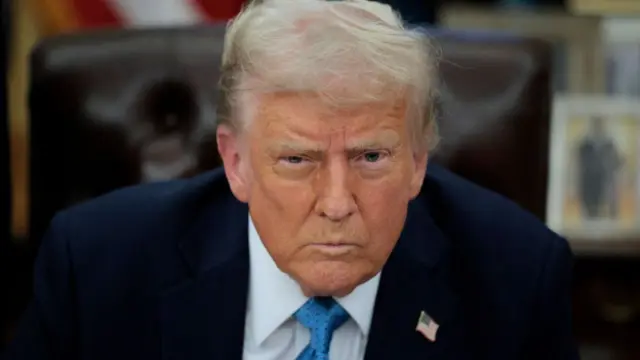 Image source, Getty Images
Image source, Getty ImagesTrump addressed reporters in the Oval Office on Friday after signing orders to impose tariffs against China, Canada and Mexico
Good morning to our readers in the UK and Europe. On Sunday night in the US, President Donald Trump had warned that he may widen the scope of his tariffs to include the European Union and the UK.
Here's more on that:
Stay with us as we bring you the latest.
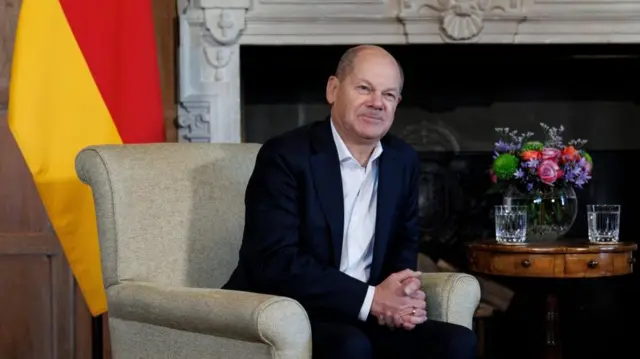 Image source, EPA
Image source, EPAEarlier on Sunday - before Trump's latest threat that tariffs on the EU "will definitely happen" - German Chancellor Olaf Scholz had cautioned against dividing the world with new trade barriers.
"Everyone benefits from globalisation," said Scholz, after a meeting with UK Prime Minister Keir Starmer at Chequers, Buckinghamshire.
He added that as a major economic power, the EU has "scope for action" to respond to any of Washington's potential sanctions.
Member states will "try to continue economic relations together with the perspective of cooperation and collaboration," he said.
In Trump's earlier threats to the EU, he had accused the bloc of "treating [the US] very very badly" and warned that "they're going to be in for tariffs".

 Nick Marsh
Nick Marsh
Asia business reporter
Today could be the start of a chain reaction that economists fear will lead to a global economic slump.
After the flurry of tariffs on the weekend, shares of companies listed in Tokyo, Seoul and Hong Kong all tumbled this Monday morning. When markets in the US and Europe open later today, stocks are expected to plunge there too.
As the leading economic power, what happens in the United States sets the tone for the rest of the globe— and therefore President Trump is taking a gamble with not just his own economy, but the whole world's.
Although many senior Republicans have dismissed the argument that taxes on foreign goods will push up prices for ordinary consumers, even President Trump has accepted that Americans may feel "some pain".
If inflation does increase in the United States, then interest rates will probably also increase. This generally causes investors around the world to have less confidence (and cash) to invest in the stock market.
Any global slump would be further exacerbated if and when more countries start retaliating with reciprocal tariffs on US goods — and suddenly we would have a world trade war on our hands.

 Jonathan Josephs
Jonathan Josephs
Business reporter
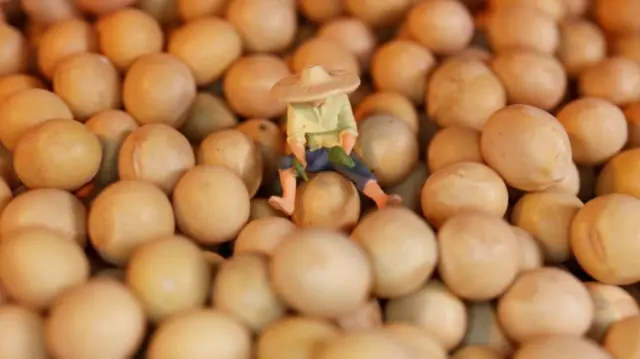 Image source, Reuters
Image source, ReutersThe US and China are the world’s two biggest economies and on Wednesday we’re set to find out whether the value of the trade relationship between them fell for a second consecutive year.
That’s because we’ll get the next set of US trade figures. From the US side it's about buying electronics such as laptops and smartphones as well as toys, machinery and furniture.
On the other side the stuff that China buys the most from America includes fuels, machinery, and agricultural produce such as the soy beans that drew a lot of attention in Trump’s first term.
In that first term the value of the relationship fell before rising and then falling again under Joe Biden’s watch.
With China promising countermeasures the goods that go both ways over the Pacific Ocean are set to get more expensive which is likely to lead to another fall in the year ahead.
This time Donald Trump has said he will tackle the fentanyl crisis in the US. But in the past one of his biggest problems with China has been that for years America has been buying a lot more goods from China than the other way round.
He sees that as costing the US substantial sums – and it remains to be seen whether he’ll repeat his efforts to pressure Beijing into trying to make it a more balanced relationship.
 Natalie Sherman
Natalie Sherman
New York business reporter
Pharmala, a Canadian biotech company that makes pharmaceutical-grade MDMA, has been exploring shifting more of its manufacturing to Australia while scouting for a local US distributor.
Nick Kadysh, Pharmala's founding chief executive, said it has done this to shield its US customers from added costs. Its customers include universities and researchers who are tied to the US Department of Veterans Affairs investigating treatments for PTSD.
He says every single one of his US customers has asked for extra supply since Trump started threatening tariffs on Canadian goods, even though the shipments for medical research have historically been tariff-free.
As a global business, Kadysh says he is not worried about his own survival, rather he is concerned about the impact on research in the US.
”When you have a dramatic change in price in that clinical trial period, what ends up happening is research just dies,” he says.
 Nadine Yousif
Nadine Yousif
Reporting from Toronto
While many economists project the tariffs will also drive up costs for Americans on everyday essentials, from petrol to groceries, Canada is the more exposed trade partner. If they last for months, the country could tip into a painful economic recession.
Anger is building - and with it, a desire to mount a fight that has been echoed by political leaders in the country of 40 million.
Some Canadians have already heeded the calls for solidarity. On social media, guides are circulating on how to avoid American-made products at the grocery store.
Thomas Juneau, a professor at the University of Ottawa with a focus on national security, told the BBC that Trump's tariffs "undoubtedly represent an earthquake in Canada-US relations."
"This is extremely destabilising for Canada," Prof Juneau said. "As a country, we have massively benefited from our extremely close trade and security partnership with the US for decades."
More: Canadian fans boo US anthem as tariffs spur 'buy local' pledge
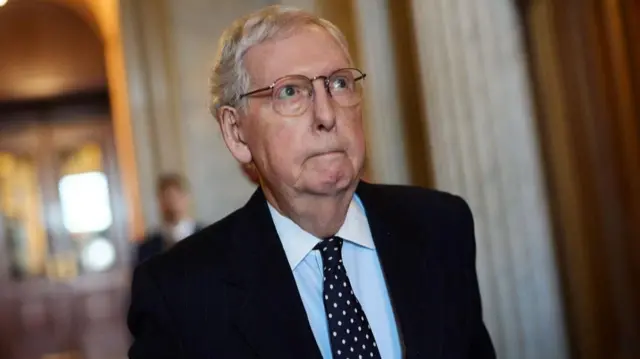 Image source, EPA
Image source, EPAKentucky senator Mitch McConnell has disagreed with Trump's move to slap tariffs on the US' neighbours.
"It will drive the cost of everything up. In other words, it will be paid for by American consumers.
"I mean, why would you want to get in a fight with your allies over this?" the former Senate minority leader said on CBS' 60 Minutes on Sunday night, external.
The 82-year-old is one of the few Republican politicians to speak out against the president's orders.
He was also one of three Republicans who voted against Pete Hegseth, who was narrowly confirmed as defence secretary last month.
 Image source, Mayor Drew Dilkens' Facebook
Image source, Mayor Drew Dilkens' FacebookCanada's border cities - including Windsor, widely known as the country's car manufacturing capital - are bracing for the impact of Trump's tariffs.
Windsor's mayor Drew Dilkens describes the US president's moves as a "lose-lose proposition", adding that there will be casualties on both sides of the border.
"One person described this as a circular firing squad... No one is going to win at the end of the day," he told the BBC's Carl Nasman in an interview.
Mayors of Canada's border cities have joined forces in the last few days, creating a new Border Mayors Alliance to jointly support workers and businesses in their cities in response to the tariffs.
Dilkens said tariffs are not the solution to the problems Trump cited, including illegal immigration and drugs.
"We have a shared goal to relieve those things and solve those problems together... It's hard to believe that's really the end goal [of Trump's tariffs]," he said.

 Laura Bicker
Laura Bicker
China correspondent
If China is fuming over Donald Trump’s 10% tariff, it is hiding it. Unlike Canada and Mexico, Beijing has not yet detailed a plan to retaliate.
Instead, it plans to take legal action and use the World Trade Organization to air its grievances. China did this in 2018 and won its case, but it also slapped its own tariffs on US goods.
This time Beijing is urging Washington to enter talks and “meet China halfway”. Trump's move is the latest in a series of tariffs imposed by the US in recent years.
It is still the Chinese New Year holiday until Wednesday, so it could be that more reaction will come. For now at least, Beijing appears to be holding its fire.
So why are there no flashes of anger? China may want to limit the damage and not provoke Washington as it tries to aid its own sluggish economy.
President Xi may also hope he can do a deal with Donald Trump. In repeated statements from the Foreign Ministry and the Commerce Ministry, Beijing has urged the US to enter negotiations.
And then of course there’s China’s bigger aim - to be at the centre of a new world order, one not led by the United States.
As Trump threatens Mexico, Canada and the EU with tariffs, China may hope to appear as a calm, stable and perhaps a more attractive global trade partner.
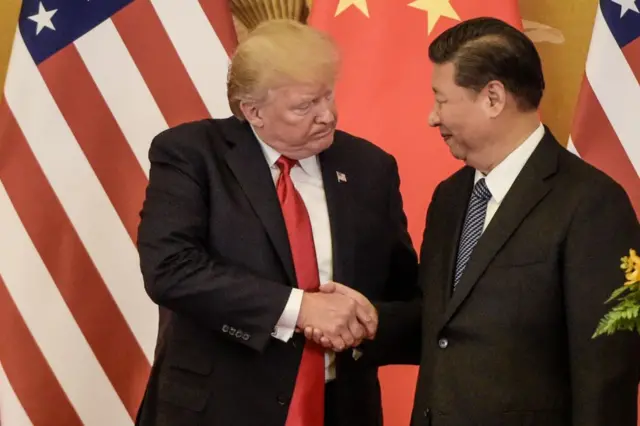 Image source, Getty Images
Image source, Getty ImagesTrump and Xi met in 2017 in Beijing during Trump's first term as President
Trump's tariffs on Canadian energy exports will "absolutely" increase prices at the pump in the US, according to Mukesh Sahdev of Rystad Energy.
He told the BBC's Business Today programme that if America's tariff policy lasts ''beyond a quarter into the summer season'', then there will an impact on prices.
In the shorter term though, he believes supply chains will be able to adjust to any disruptions.
Canada and Mexico are the two largest oil exporters to the United States, with the US importing four million barrels per day from its Northern neighbour.
Levies on oil imports mean higher costs for making fuels like gasoline, much of which would likely to be passed along to US consumers.
The US President said that Washington has "had very good talks" with Mexico, but warned of "worse tariffs" for the country if its government does not stop the flow of fentanyl and migrants into the US.
"This is retaliatory to a certain extent," he said.
"Millions of people flowed into our country through Mexico and Canada. And we're not going to allow that," he said.
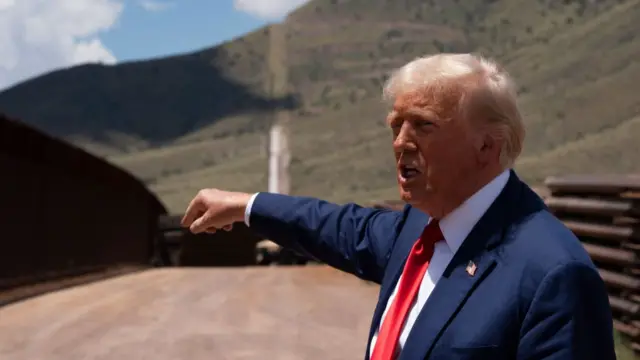 Image source, Getty Images
Image source, Getty ImagesTrump spoke at the US-Mexico border during his campaign last year
More from Trump's comments to reporters: the US President also acknowledged that Americans will feel "in the short term, a little pain", but defended his imposition of the tariffs.
"People understand that," he said.
"The United States has been ripped off by virtually every country in the world.
"We have deficits with almost every country... and we’re going to change it. It’s been unfair," he said. "We've been helping everybody for years. And to be honest I don’t think they appreciate it."
Separately, in an early morning Truth Social post, the president had argued that "some pain" will be worthwhile.
"We will make America great again, and it will be all worth the price that must be paid," he wrote.
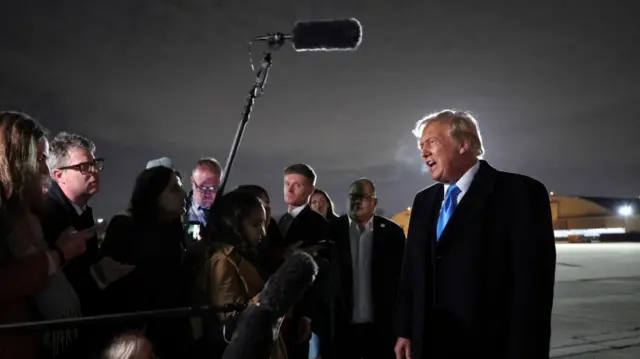 Image source, Reuters
Image source, ReutersWe're getting more of Trump's comments after landing at Joint Base Andrews from Florida now.
Speaking to reporters after getting off the plane, President Donald Trump says he will raise tariffs on Canada if they retaliate, accusing the US' northern neighbour of being "very abusive of the United States for many years".
"I love the people of Canada. I disagree with the leadership of Canada. And something's gonna happen there.
"But if they want to play the game, I don't mind. We can play the game all they want," he says.
Joao Da Silva
Business reporter
Markets in Asia are falling on Monday after US President Donald Trump announced tariffs of 25% on goods from Mexico and Canada, and an additional 10% tax on imports from China.
Hong Kong's Hang Seng Index was down 1.5%, Japan's Nikkei 225 was 2% lower, South Korea's Kospi tumbled 2.7% and Australia's ASX 200 was 1.6% lower.
Markets in mainland China remained closed for the Lunar New Year holiday.
Meanwhile, the US dollar was showing strength. The greenback hit a 20-year high against the Canadian dollar, while China's offshore yuan plunged to a record low.
Investors are facing huge uncertainty as other countries announce retaliatory tariffs on imports of US goods, raising the prospect of further escalation.
 Nomia Iqbal
Nomia Iqbal
North America correspondent
Tariffs on EU goods imported into the US will happen "pretty soon", says President Donald Trump.
"They've really taken advantage of [the US]," he says.
"They don't take our cars, they don't take our farm products. They take almost nothing, and we take everything from the millions of cars, tremendous amounts of food and farm products."
Asked by the BBC if there's a timeline for announcing EU tariffs, Trump says: "I wouldn't say there's a timeline, but it's going to be pretty soon.
"The United States has been ripped off by virtually every country in the world. We have deficits with almost every country - not every country - but almost, and we're going to change it. It's been unfair."
 Nomia Iqbal
Nomia Iqbal
North America correspondent
More now on those comments from President Trump about whether he is planning to impose tariffs on UK and EU trade.
Discussing whether any issues he has with the UK could be worked out, Trump says Prime Minister Sir Keir Starmer has “been very nice”.
“We've had a couple of meetings. We've had numerous phone calls. We're getting along very well,” he says.